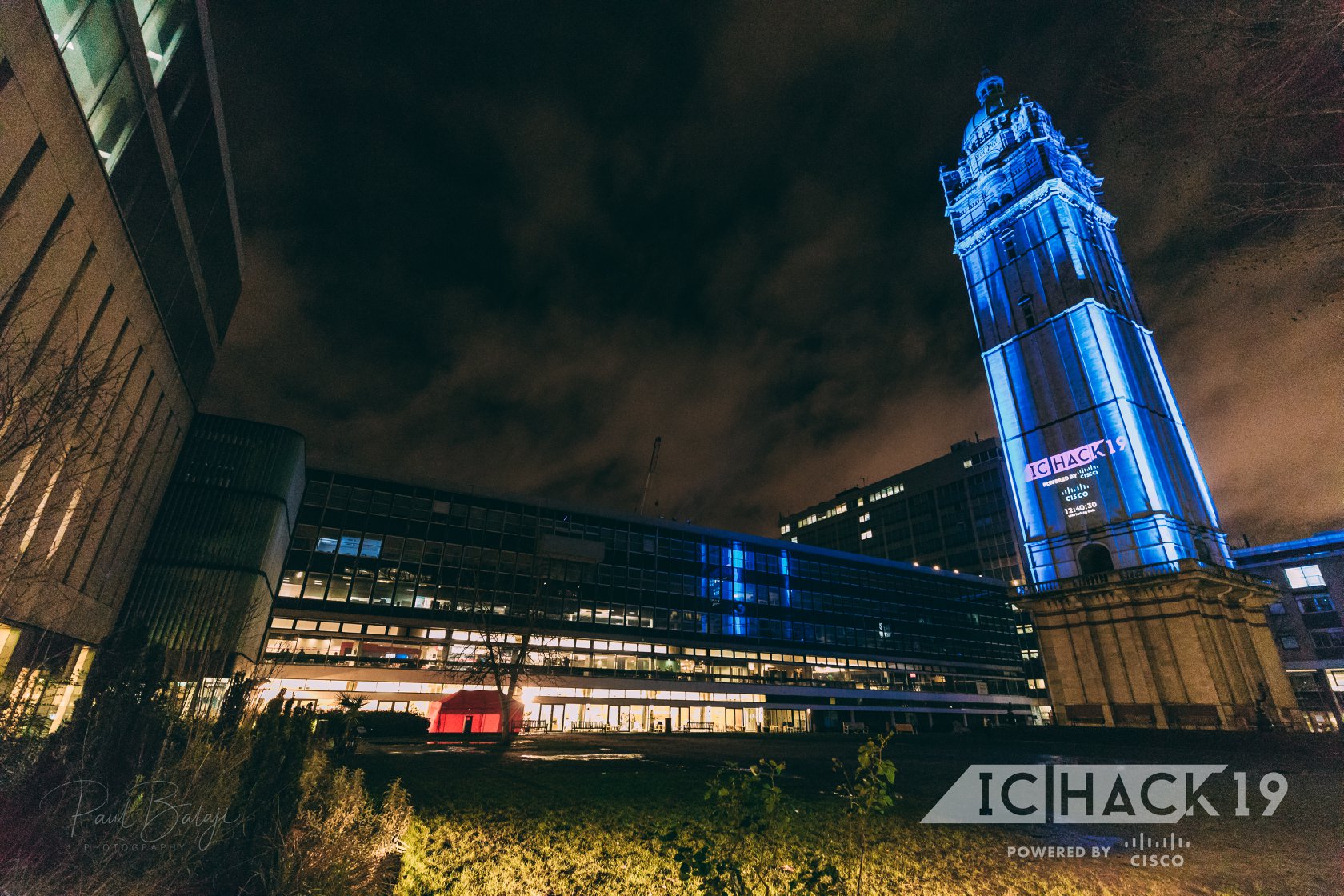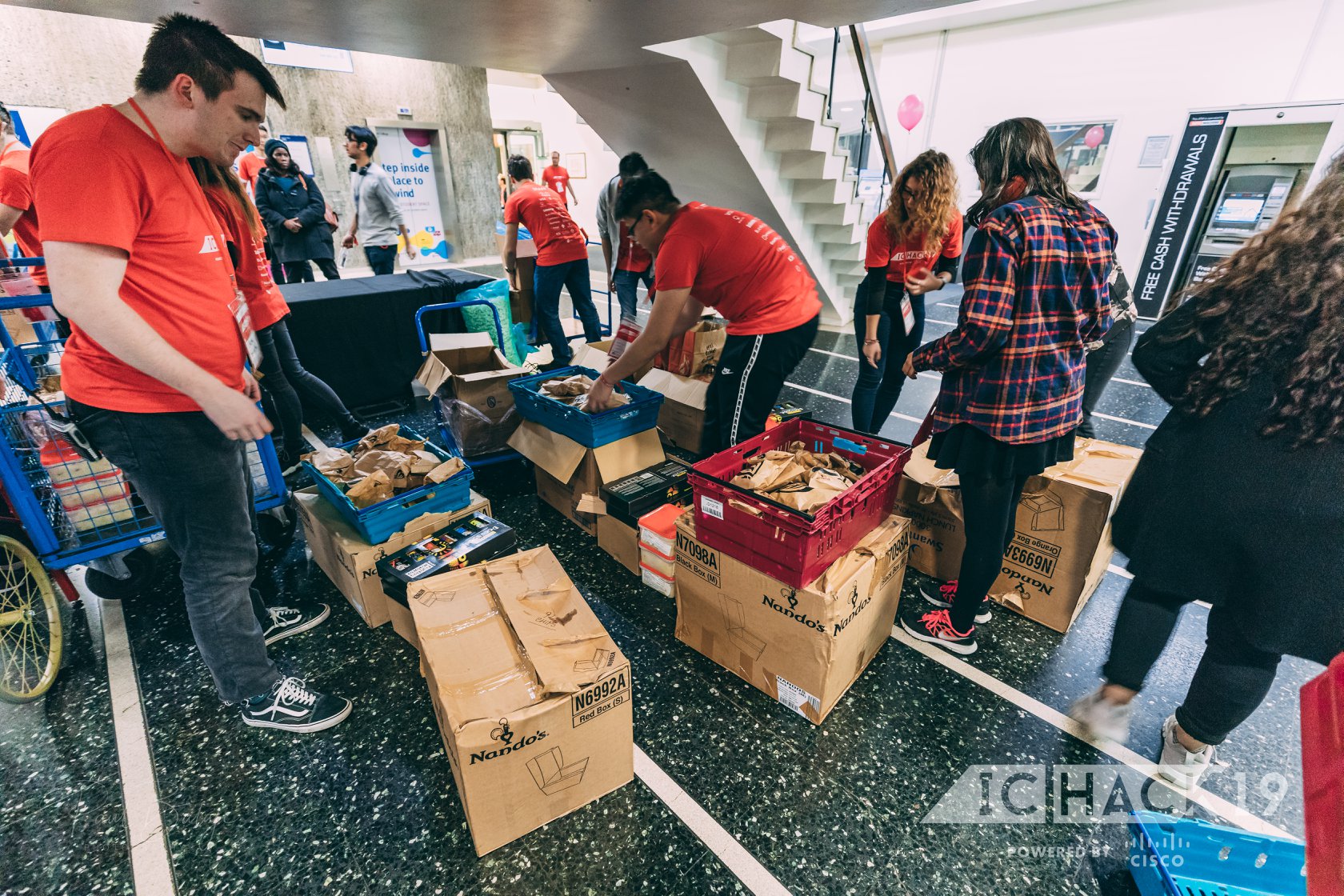How to organize a hackathon as a student 101. Part One

Hello everyone, I have already come across articles about hackathons several times: why people go there, what works, what doesn't. Perhaps people will be interested to hear about hackathons on the other hand: from the organizer. Please note that this is about the UK, the organizers from Russia may have a slightly different opinion on this matter.
A small background: I am a 3rd year student at Imperial College London, a programmer, I have been living here for 7 years (the quality of the Russian text could suffer), I personally participated in 6 hackathons, including the one that will be discussed now. All events have been attended by me personally, so there is a bit of subjectivity. At the hackathon in question, I was a participant 2 times and 1 time an organizer. It is called IC Hack, created by volunteer students and ate 70-80 hours of my free time this year. Here is the project website and some photos.


Hackathons are usually organized either by companies (here the size of the company itself does not play a role), or by universities. In the first case, questions on the organization are noticeably less. The sponsor is provided by the company itself, usually an agency is hired to organize the event (sometimes the employees themselves are 100% organizing), the jury is recruited from the staff and often the topic is proposed on which the project is proposed. A completely different thing is university hackathons, which are also divided into two categories. The first is of interest to small universities with little experience in conducting such events. They are organized through MLH (Major League Hacking), which takes responsibility for almost the entire process.
It is MLH that sponsors, occupies most of the jury and teaches students how to conduct hackathons in the process. Examples of such events are HackCity, Royal Hackaway and others. The main plus in stability. All hackathons organized in this way are very similar to each other, all run according to one scenario, have similar sponsors and do not require special training from students conducting these events. The cons are obvious: the events are not much different from each other up to the prize categories. Another minus is the small amount of financing (from the official site of Royal Hackaway 2018 you can see that the gold sponsor brings them 1,500 GBP) and the very meager choice of “swag” (free merchandise brought by sponsoring companies). From my own experience I can say that such events are not very large in size, they are friendly to newcomers and you can almost always get tickets for them (I thought to go or not within 3 days, but even half of the tickets were not sold) and they often have similar competing teams (70-80% of all projects are related to web applications). Therefore, the teams “hipsters” is not very difficult to stand out against their background.
PS Tickets are almost always free, it is considered bad form to sell a ticket for a hackathon.

Now that I’ve briefly talked about alternatives, let's get back to the main topic of the post: hackathons organized by independent enthusiastic students. To begin with, who are these students, and what is the actual profit of organizing such an event? Most of these people themselves are frequent participants in hackathons, they know what works well and what they don’t really want, and they want a hackathon with

Let's start with the first obvious problem: the budget. A small spoiler: organizing such events even at your own university (where the rent is low / absent) can easily cost GBP 50,000 and finding such an amount is very difficult. The main source of this money is sponsors. They can be both internal (other university communities that want to advertise and gain new members), as well as corporate ones. The process with internal sponsors is quite simple: acquaintances, professors and tutors who administer these communities. Unfortunately, their budget is small and in some cases provides services (place snacks in their closet, borrow a 3D printer, etc.) instead of money. Therefore, it remains to hope for corporate sponsorship. What is the profit for companies? Why do they want to invest in this event? Hiring new promising personnel. In our case, 420 participants, which is a record for the UK. Of these, 75% are students of Imperial College (currently university number 8 in the world ranking).
A lot of companies practice summer / year internships for students and this is a great chance to find people who already have experience and desire to work in this industry. As our president said: why overpay 8,000 recruiting agencies for 2-3 potential candidates, when you can pay 2,000 to us for 20 new candidates directly? Prices depend on the size of the hackathon, the reputation of the organizers and many other factors. Ours start from 1000 GBP for small startups, and go up to 10.000 GBP for the main sponsor. What exactly sponsors receive depends entirely on how much they are willing to offer: bronze sponsors will receive a logo on the site, the opportunity to speak at the opening, access to a summary of all participants and the ability to send us your merch to give it to the participants. All statuses starting from silver make it possible to send your engineers so that they recruit directly on the spot, create your own prize category, workshop for participants with a bonus to all bronze perks. From personal experience, I can say that one of the silver-level companies recruited 3 people (2 for the summer and one for a permanent position) right during the hackathon, and I did not even count how many they could still hire after the mailing at the end. Creating your own prize category allows you to find those who make projects similar to the company's products. Or see who can answer a very open question in the most creative way (Most Ethical Hack powered by Visa for example). Depends on the company. Every year we gather 15-20 sponsors, including Facebook, Microsoft, Cisco, Bloomberg and others. We work with everyone: From startups to industry giants, the main rule is profit for our students. If you have to refuse a sponsor because our students did not leave the best reviews about the practice / permanent work in this company, then we will most likely refuse.

How do we find sponsors? This is a process worthy of a small article, but here is a brief algorithm: find a recruiter on LinkedIn / find a person with a contact in this company; to coordinate with the committee of organizers how big this company is, how good its reputation is (we try not to work with those who have a bad reputation in student circles, whether it be related to trainees or an attempt to save on their salaries) and who will be the main point of contact. This is followed by a long debate about how much this company can offer us and a commercial proposal is sent to it. We have a very flexible sponsorship system and therefore negotiations can drag on for a very long time: the sponsor must understand what he pays for and therefore we reserve the right to add / remove some points from the proposal, if the sponsor believes that they will not bring a special profit to the company. After negotiations, we will agree on the amount with the university, sign a contract and invite them to a meeting of the organizers to discuss exactly what they want to receive from the event and how exactly they want to advertise themselves to students. There are cases when companies paid less than GBP 3,000 and received a dozen potential employees for full-time employment after graduation.

Why do we need this money? Sneaky or something 3000 for sponsorship to demand? In fact, this is a very modest amount by the standards of the event. Money is needed for a huge amount of necessary things (lunch x2, snacks, dinner x2, pizza, breakfast and drinks for all 48 hours) and not very (waffles, bubble tea, rental consoles, three-hour bar rental, karaoke, etc.). We try to make sure that everyone remembers the event only with good things, so we buy a ton of delicious food (Nandos, Dominos, Pret a Manger), a huge number of snacks and drinks, and every year we add new entertainment. This year I fried popcorn for 500 people, in the past I made cotton candy. The budget for this, keeping in mind 420 participants, 50 organizers and 60 sponsors can easily be exceeded for 20,000 GBP.

And there is also electricity, security, prizes (very good by student standards: PS4 for example) for all team members. And this is a maximum of 5 people per minute. This is followed by “swag” from sponsors and from us. T-shirts, thermal mugs, backpacks and a ton of other useful things in the household. Given the scale, you can easily spend a few thousand more. Despite the fact that we conduct IC Hack at the university, we pay rent. Smaller than a third-party company, but still. Plus the cost of cooks for lunch (the university forbids lunch on their own, and who knows why), renting a projector (since its cost is several times higher than the cost of the hackathon itself) and other costs that many do not think about. Most of the prize categories were invented by us and prizes are selected and bought by us too (more on that in the next part). This time the budget for prizes exceeded 7000 GBP. I can’t name the exact amount, but I’ll say that this year the costs easily exceeded 60,000 GBP. Here are the photos of the winners.

Money collected, budget agreed, prizes and food ordered. What's next? Crazy hell and sodomy, also known as site preparation. All this beauty begins 2 months before the hackathon. A huge amount of furniture must be moved, the risk of assessments is filled, loads are received, plans are signed, and so on. The list is huge. That is why we call a huge number of volunteers to help us in the organization process. And even they are not always enough. But this is the topic for the next article.

This is the first part of my story about organizing IC Hack. If there is enough interest, I will release 2 more parts about the main problems and blocks in organizing the site itself and tell you a little about the prizes, categories and experience of sponsors, organizers and participants (including direct reporting from the BBC from the scene). If you are interested in learning more about IC Hack, please email me at du216@ic.ac.uk, or if you are interested in sponsoring the largest hackathon in the UK, then welcome. I return to the headquarters of the organizers one more time.

